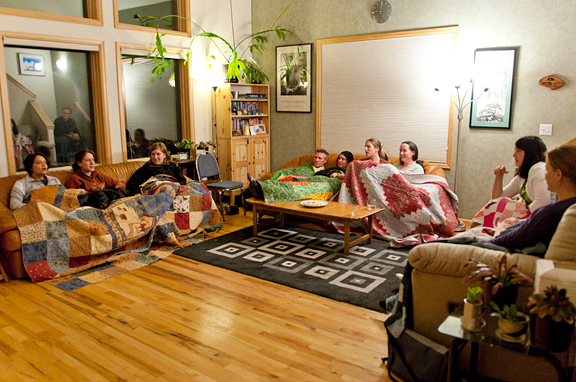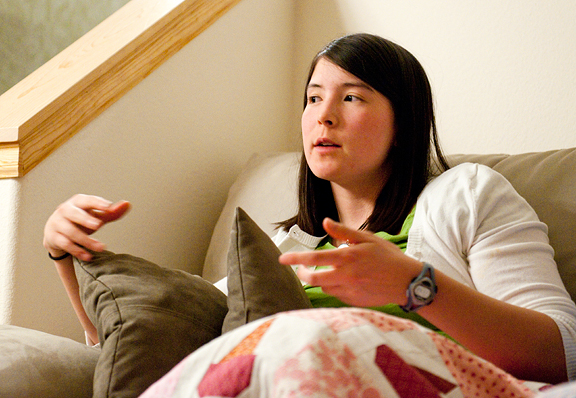good food, great friends, excellent discussion
Friday, March 19th, 2010 Recipe: meyer lemon macarons
Recipe: meyer lemon macarons
I think everyone knows just how much I enjoy having friends over to share a meal. Feeding others is an act of love in my book. The conversations that take place – from inane to serious – are never short of entertaining.
a gorgeous day for a potluck

Don’t be fooled into thinking that every day in the Colorado mountains looks like that. We had originally planned our potluck for the weekend, but that fickle March mountain weather dealt us some mean ice and snow. Everyone agreed to reschedule, because it was important. This wasn’t any old potluck. PBS POV contacted me a couple of weeks ago to ask if I’d be interested in hosting a potluck and a screening of the documentary Food, Inc..
credit: magnolia pictures

Had anyone else asked me to do this I would have laughed until I cried because my March schedule is 200% overfull. But I have a soft spot for PBS and the issue of where our food comes from is an intricate and complex one that concerns me greatly. Yes. Yes, of course I’d love to participate. The overwhelming response from my friends indicated that they had a lot of thoughts and questions on the matter too.
prepping brussels sprouts

Hosting a potluck that highlights healthy, local, and sustainable foods in Colorado in March is no trivial task. If anything, it forced me to scrutinize my purchases more carefully. Most of the produce I used came from Colorado, Arizona or California. The meat was organic (bacon) or the least offensively raised pork I could find (pork shoulder for the posole). My posole had some regional special ingredients that I had saved in my freezer and pantry: roasted hatch green chiles from New Mexico, frozen posole (white hominy) from the Santa Fe farmer’s market, and dried red New Mexican chiles. [I bought the reds in New Mexico last fall and my aunt scored me the green chiles and posole.] Our guests brought a variety of wonderful vegetarian dishes including pickled beans from their own garden!
barbara kingsolver’s dilly beans, spanish omelette, penne with lentils and kale

posole with fixins, whole grain and berry salad, roasted brussels sprouts with potatoes

citrus and feta salad, aspen apple cake + lemon macarons + gajar halwa, usal (sprouted lentils)

The logstics of a surprise are always complex and so we had to start the dinner without some of our guests (Beth was picking up Marianne’s sister who flew in for a surprise visit this week).
loading up our plates

dinner talk

enjoying the wonderful variety

Eventually everyone trickled in and the house was full of reunions and happy conversations. As the plates cleared, we broke down the tables so folks could retire to the couches, huddle under the quilts (just in case you thought the next set of photos looked suspiciously like a slumber party), nibble on lemon macarons, and watch the feature documentary Food, Inc.
the set up (kaweah chose to lie on marianne, our birthday girl)

Food, Inc. is a 94 minute documentary that forces you to think, really think about what the food industry is producing, what you are eating, and all of the social, economic, agricultural, moral, energy, political, legislative, environmental, and public health consequences intricately tied to these issues. If you eat food, you should care and you should watch this film. Our post-screening discussion was lively. Even though it was a weeknight and it was late, people still wanted to talk and the topics were broad and deep.
no way!

Several in the group have science backgrounds (geology, biology, physics), but we also had engineers, an environmental engineer, programmers, and an economist. There isn’t enough room on this page to do the discussion justice, but I’ll hit on some key points that stood out that evening. The most obvious to us was that large corporations involved in the food industry are more concerned with profit than with the public’s well-being.
jeremy explains how natural gas is used to produce some fertilizers

People were floored to learn of the blatant infiltration of industry insiders into the top regulatory and advisory ranks of our country’s government under both Republican and Democratic administrations. It is a veritable revolving door which perpetuates the monopolies and oligopolies that dictate what and how we eat.
Some of those monopolistic companies bring SLAPP (strategic lawsuit against public participation) lawsuits against small businesses or individuals who can’t afford to fight them in court, just so they go out of business or conform to the company’s demands (like forcing them to purchase the company’s seeds or products).
Did you know that in the state of Colorado and other states you cannot libel food? These are called veggie libel laws.
everyone listened intently

but there was plenty of laughing too

Where do you draw the line between husbandry and genetic manipulation? We pointed to Kaweah and said she was a perfect example of a GMO (genetically modified organism) through selective breeding. But what about insertion of animal genes into plants?
There is great concern over the issue of biodiversity. The homogenization of food crops makes the food supply vulnerable to widespread devastation by single events or diseases.
nichole’s family runs a farm in michigan

The small farmer in America is getting screwed.
We don’t pay what food really costs. The true cost of food should include environmental impact, energy consumption, packaging and waste, health. Heavily subsidized products like corn find their way into all manner of processed foods (and things you wouldn’t eat) and so the crap foods are cheaper than the wholesome foods. That’s no way to feed a country.
ali, matt, and drea

Beth asked how many of us grew up sitting down to dinner and eating with the whole family. Almost all of us raised our hands. I think there is a strong connection between what we learn about food growing up and what we end up eating as adults. A generation of people raised on junk and convenience foods aren’t in a very good position to teach their children how to eat a healthy and sustainable diet.
We talked about waste and methane production, the benefits and drawbacks of organics expanding into big box markets (Wallmart), water rights, consumer rights, how illegal immigration crackdowns target the immigrants, but not the companies who hired them, the financial entrapment (Jeremy calls it indentured servitude) of small farmers to the dominant companies.
ali is an environmental engineer

I’m sitting in a cafe on the road to Utah for a shoot – short on time (aren’t I always?). It’s not because I don’t have the time to talk about the issues so much as there are far too many issues to discuss at length. Food is an integral part of civilization. It is one of the three essentials for life (food, water, shelter) and it has been commoditized while some believe it is a human right. We need to have a discussion, educate one another, share, learn. You can join the potluck too. PBS POV is airing Food, Inc. on April 21, 2010. It’s a great opportunity to host a potluck of your own. Gather your friends and family together and watch the documentary on television or you can view Food, Inc. online from April 22-29, 2010 (click on the link). Talk about it. Then visit the site between April 22nd and May 3rd to enter PBS POV’s giveaway which includes autographed books from Michael Pollan and Eric Schlosser, a copy of the Food, Inc. DVD, sustainable food items, gift cards and other great prizes.
I was thinking about what I said at the beginning of the post – that feeding someone is an act of love. If you love someone, you probably wouldn’t knowingly feed them some of the “food” that churns out of corporate factories. But a lot of people do just that because they don’t know better, they don’t know the truth about what goes into the food we are sold. And then some simply cannot afford to eat well, to eat healthily. How can junk food be cheaper than healthy food? Think about it. Then maybe you’ll want to do something. And maybe we can make a change.
Right, so there IS a recipe because these meyer lemon French macarons are too good NOT to share. Just ask my potluck guests, they will vouch for them. The recipe comes from my dear friend, Helen who is the high priestess of French macs. If ever I think about a flavor combination to try, I always check her blog.
simple ingredients: powdered sugar, almonds, granulated sugar, eggs, meyer lemons

that zest is the best thing ever (i just want to roll in it)

**Jump for more butter**





 Recipe: creamy mushroom soup
Recipe: creamy mushroom soup




 Recipe: bibimbap
Recipe: bibimbap








